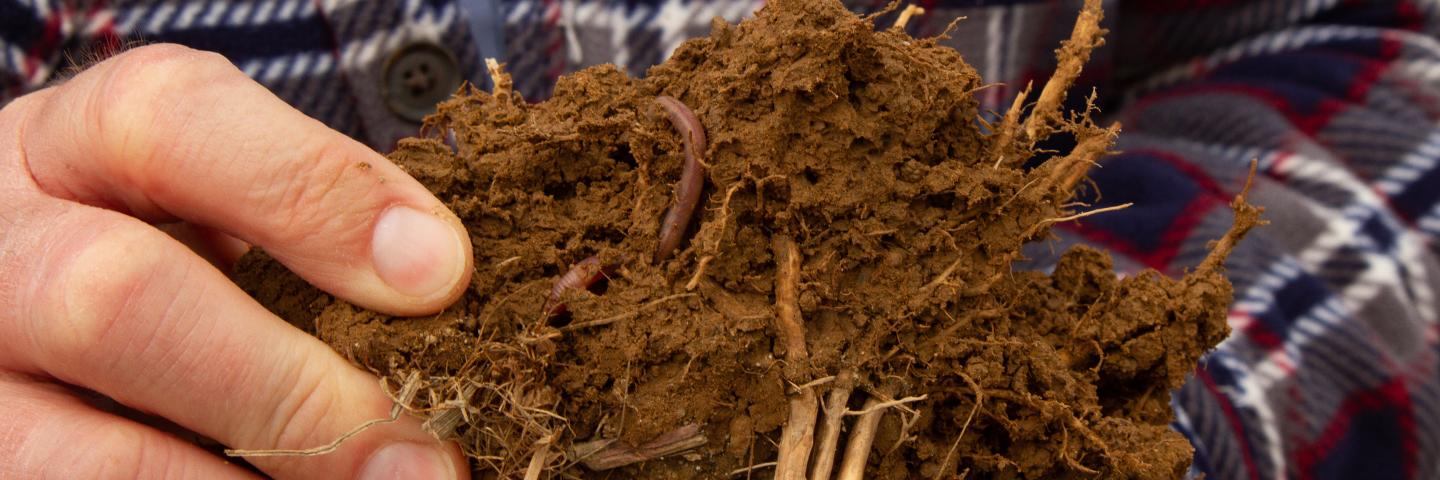
Soil Health in Tennessee
Soil is a living and life-giving substance, without which we would perish.
As world population and food production demands rise, keeping our soil healthy and productive is of paramount importance. So much so that we believe improving the health of our Nation’s soil is one of the most important conservation endeavors of our time.
The resources on this soil health section of our site are designed to help visitors understand the basics and benefits of soil health—and to learn about Soil Health Management Systems from farmers who are using those systems.
Tennessee featured nationally
Ron Harrison, Paris Field Office district conservationist, was recently featured in this week's FPAC's "In the News" feature focusing on a different “Conservation at Work” practice that highlights a conservation exercise that is being applied by farmers, ranchers, and forestland owners. This week the video Conservation Crop Rotation is highlighted.
Featured Article
Farming for the future: Cover crops: Trends and next steps for Tennessee
Tennessee’s state motto, “agriculture and commerce,” drives home the important role that agriculture plays in the state’s identity and its importance to the Tennessee landscape and economy. By the numbers, in 2017 Tennessee’s row crop producers (notably soybean, corn, wheat, and cotton growers, in descending order) were stewards of approximately 11% of the state’s total land area, covering a footprint of just under three million acres (USDA-NASS 2019), and generating nearly $2 billion in value (USDA-ERS 2022).
Looking to the future, as Tennessee faces increasingly frequent and severe weather events that threaten agricultural producers and urban communities alike (Carter et al. 2018), farmers are poised to play an integral role in securing the state’s continued economic success, food security, and positive environmental outcomes. To address these challenges and stay competitive in the global marketplace, many Tennessee farmers are turning towards conservation practices that protect and improve their most valuable asset—the soil— and that are also economically sound. Every management approach comes with its benefits and challenges, and conservation practices such as no-till and cover crops are no different.
In this publication we provide information specific to Tennessee to help local farmers and the greater community better understand how increased adoption of cover crops specifically would serve to better sustain agricultural and environmental well-being across the state and beyond.
Click below to read more:
NRCS is also strongly rooted in soil, as the agency was born as the Soil Conservation Service in 1935 during the Dust Bowl, a time of eroded topsoil and fierce dust storms.

Major Land Resource Area
Major Land Resource Area including the publication Land Resource Regions and Major Land Resource Areas of the United States, the Caribbean, and the Pacific Basin (USDA Agriculture Handbook 296,
Dickson: Tennessee State Soil
Many states have a designated state bird, flower, fish, tree, rock, etc., and many states also have a state soil – one that has significance or is important to the state. The Dickson is the official state soil of Tennessee. The Dickson series was established in 1923 in Dickson County, Tennessee, where it was first mapped in the Soil Survey of Dickson County, Tennessee (published 1926). Let’s explore how the Dickson is important to Tennessee.
Soil success stories from across Tennessee.
State Soil Staff
| Name | Position | Phone Number | |
|---|---|---|---|
|
Aaron Friend
|
State Soil Scientist
|
||
|
Katherine Brewer
|
Compliance Coordinator/NRI Coordinator
|
||
|
Jennifer Fedenko
|
Resource Soil Scientist
|
||
|
Adam Daugherty
|
State Soil Health Specialist
|


